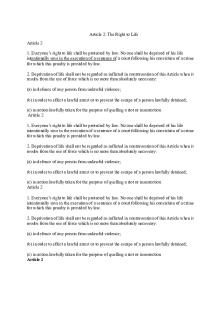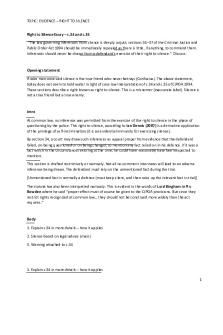Right to information PDF

| Title | Right to information |
|---|---|
| Author | lejerod limpuong |
| Course | Administrative Law |
| Institution | Universiti Teknologi MARA |
| Pages | 5 |
| File Size | 126.9 KB |
| File Type | |
| Total Downloads | 59 |
| Total Views | 138 |
Summary
Download Right to information PDF
Description
RIGHT TO ACCESS INFORMATION The citizen has the right to information of the state administration. However, it was not an absolute right as it is subjected to certain matters. On the other hand, the government enjoys privilege not to disclose information for the purpose of interest and state security. This privilege has been applied strictly for the governmenti. In the case of 1Duncan v Cammel Laird & Co (1942) AC 264 , when a sailing test was held, a submarine built by a contractor for the armed forces did not emerge. One of the wife out of the victims wanted to claim for compensation on the ground of negligence. She has applied few information including the submarine plan to be produce before the court. The army then applied for government privilege not to disclose that information for the purpose of state security. It was held, that the information must not be disclosed on the ground that the affidavit made by the concerned Minister was final and could not be questioned. However, there are time when the court will be the one who would decide whether to disclose the information or not, in certain situations. Like in 2Conway v Rimmer (1968) 2 AC 910, a police constable was accused of theft. He was then later acquitted. He sued the superintendent who made the allegation against him on the saying that it was made mala fide. He requested certain documents from the authority, they did not cooperating saying that the information relating to state affairs and could not be disclosed. It was held , that the decision of the Head of Department could not be considered as final because the court would itself examine the relevant document without referring to any party and would itself come to a decision whether it related to state affairs or not. Next, there will also time when the disclosure of information would not be made at all because of public interest. This happen when information is secured secretly to enable receiver to carry out his duties effectively. In the case of 3Burmah Oil v Bank of England (1979) 3 All ER 700, the government had invoke government privilege concerning certain documents relating to business transactions between the Bank of England and Burmah Oil Co. In their defense, the government mentioned that the documents had connection with government policy. It was held that the government could invoke government privilege over the documents because in their opinion this was a political matter of the transactions that could lead to unwanted consequences from the state political perspective. In Malaysia, there are two main statutes that are related to government privilege not to reveal any information which are The Evidence Act 1950 and The Official Secrets Act 1972. Section 123 of the Evidence Act 4, Provides that no one is allowed to disclose any unpublished records which are related to the affairs of the state except with the permission from the head of the concerned department who will either allow or disallow, if necessary to do so; nonetheless, this is subject to the control of the Minister or the Chief Minister. Section 124 5Provides that no public officer is forced to disclose or reveal any official communication he makes, if he feels the interest of the public will be jeopardized because of the revelation. 1 Duncan v Cammel Laird & Co (1942) AC 264 2 Conway v Rimmer (1968) 2 AC 910 3 Burmah Oil v Bank of England (1979) 3 All ER 700 4 Section 123 of the Evidence Act 1950 5 Section 124 of the Evidence Act 1950
This is with condition that the court will require the office to certify in writing that the revelation will threaten public interest. Section 162(2) 6provides that the court will if it thinks necessary examines all documents in order to ascertain whether they can be accepted or not except for any documents related to the affairs of the state.
To conclude the said sections, official records that related to state affairs which are not published shall not be produced as evidence in the court of law. The government have special privileges over these information. In the case of A Rao v Sapuran Kaur (1978) 2 MLJ 1467, this is then issue relating to executive privilege. The respondents claimed damages on behalf of the deceased for his death, resulted by the negligence of medical officers of the district hospitals. A Committee of Enquiry had been held into the death of the deceased and respondents had issued a notice to produce the reports and findings of the Committee of Enquiry. The appellants defense themselves by virtue of section 123 of the Evidence Act, saying that the notes and findings of the Committee of Enquiry were unpublished unofficial. The learned trial judge, objecting to the production, disallowed the objection and ordered production of the reports and findings of the Committee. The appellants appealed to the Federal Court, and the appeals was however dismissed. The Federal Court, held that "it is for the court, not the executive, ultimately to determine that there is a real basis for the claim that "affairs of State is involved" before it permits non-disclosure“. The Federal Court also held that "a mere assertion of confidentiality and that affairs of State are involved without evidence in support cannot ...shut out the relevant evidence“. Next, the Official Secrets Act 1972. This statute is purposely made to protect ‘official secrets’ from unauthorized release. The gist of the law is that official Government information is not to be received, retained or released without prior authorization. Section 28 defined ‘official secret’ to mean: (i) any document specified in the Schedule to the Act; (ii) any information and material relating to the scheduled documents; and (iii) any other official document, information and material which has been classified as 'Top Secret', 'Secret', 'Confidential' or 'Restricted' by a Minister, the Menteri Besar or Chief Minister or a public officer appointed under s. 2B. The scheduled documents in number (i) refers to documents dealing with the decisions and deliberations of the cabinet and cabinet committees; documents dealing with the decisions and deliberations of state executive councils and their committees; documents concerning national security, defence and international relations. But there seems no limit on what could be included under numbers (ii) and (iii) above.
6 Section 162(2) of the Evidence Act 1950 7 A Rao v Sapuran Kaur (1978) 2 MLJ 146 8 Section 2 of the Secrets Act 1972
In the case of, Malaysian Trade Union Congress & ors V Menteri Tenaga, Air & Komunikasi [2010] 6 CLJ 2919, the applicants applied for a judicial review for two documents which is Concession Agreement and Audit Report to be revealed. It is to determine whether their right to have access to clean water at affordable price was protected. The court held that it did not fall within Sec 2 of the OSA 1972 since the documents would not jeopardized national security. Hence, no privilege of the protection from disclosure towards the respondent. In the case of Lim Kit Siang V PP [1979] 2 MLJ 37 10, Where the leader of the opposition in Parliament at that time, received secret official information about defense purchases and had communicated the information to a news review. It was held that ‘the privilege of a Member of Parliament to raise any matter in Parliament can only be invoked in respect of proceedings in Parliament and not outside the House’. Not to forget, there are also other laws regarding to official secrecy, as follows: Section 28 (5) Legal Profession Act 197611: The Roll shall be open to inspection without payment by any person during office hours. Section 19 Registration of Business Act 195612: Any person may on payment of a fee require the Registrar to certify a copy or extract any document kept by the Registrar and to issue him with a copy. Section 16 Public Officers (Conduct and Discipline) General Orders 198013: A public officer shall not publish or write any book, article or other works which is based on classified official information Section 19 National Land Code 196514: There is general duty on public servants to observe the secrecy of information received officially Section 39 Internal Security Rules 196015: No person employed in a place of detention shall communicate to the public or press any information derived from official sources or connected with his duties or the place of detention In conclusion, Right to Information is very important right to the society as it is one of features of democracy, however, be balanced with other competing and conflicting 9 Malaysian Trade Union Congress & ors V Menteri Tenaga, Air & Komunikasi [2010] 6
CLJ 291 10 Lim Kit Siang V PP [1979] 2 MLJ 37 11 Section 28 (5) Legal Profession Act 1976 12 Section 19 Registration of Business Act 1956 13 Section 16 Public Officers (Conduct and Discipline) General Orders 1980 14 Section 19 National Land Code 1965 15 Section 39 Internal Security Rules 1960
considerations. It cannot be an absolute right as it might interfere to certain information that might invoke to public interest and so on.
i...
Similar Free PDFs

Right TO Information
- 4 Pages

Right to information
- 5 Pages

Right to infomration notes
- 77 Pages

Right to Support
- 5 Pages

Right to an Occupation Fee
- 1 Pages

Problem Question Right to Cancel
- 11 Pages

Article 2 Right to Life
- 8 Pages

Access to Information
- 4 Pages

Art 5 ECHR Right to Liberty
- 6 Pages
Popular Institutions
- Tinajero National High School - Annex
- Politeknik Caltex Riau
- Yokohama City University
- SGT University
- University of Al-Qadisiyah
- Divine Word College of Vigan
- Techniek College Rotterdam
- Universidade de Santiago
- Universiti Teknologi MARA Cawangan Johor Kampus Pasir Gudang
- Poltekkes Kemenkes Yogyakarta
- Baguio City National High School
- Colegio san marcos
- preparatoria uno
- Centro de Bachillerato Tecnológico Industrial y de Servicios No. 107
- Dalian Maritime University
- Quang Trung Secondary School
- Colegio Tecnológico en Informática
- Corporación Regional de Educación Superior
- Grupo CEDVA
- Dar Al Uloom University
- Centro de Estudios Preuniversitarios de la Universidad Nacional de Ingeniería
- 上智大学
- Aakash International School, Nuna Majara
- San Felipe Neri Catholic School
- Kang Chiao International School - New Taipei City
- Misamis Occidental National High School
- Institución Educativa Escuela Normal Juan Ladrilleros
- Kolehiyo ng Pantukan
- Batanes State College
- Instituto Continental
- Sekolah Menengah Kejuruan Kesehatan Kaltara (Tarakan)
- Colegio de La Inmaculada Concepcion - Cebu






